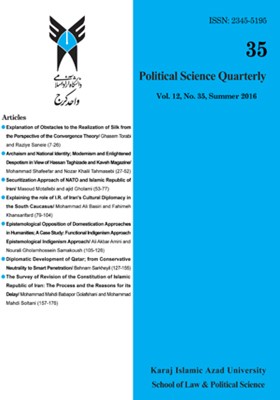Explaining the role of I.R. of Iran's Cultural Diplomacy in the South Caucasus
Subject Areas :Mohammad Al Basiri 1 , Fahimeh Khansarifard 2
1 - Assistant Prof. of Political Science Dep. University of Isfahan
2 - Ph.D. Student of International Relations, University of Isfahan
Keywords: South Caucasus, Cultural diplomacy, Center, Periphery, World System,
Abstract :
I.R. of Iran as a regional actor has many historic-cultural capacities for cultural influence in the South Caucasus region; so that this can be admission to benefit from the new tools of cultural diplomacy by I.R. of Iran in the region in order to achieving its foreign policy goals. But The Existence of internal and external obstacles has been interrupted in this context and Caused that iran has to the Semi-periphery position in the cultural field in the Periphery region of South Caucasus on base Wallerstein Thoughts. The research question is: What are the reasons for weakness in I.R. of Iran's Cultural Diplomacy performance in the South Caucasus? The research hypothesis also is that Iran at the same faced with internal challenges, marginalized in the field of culture of region due to effective performance by other actors (external obstacle). The research method in this article is descriptive-analytical and content analysis with using library tools.
منابع فارسی
- آدمی، علی و مهسا نوری (1392)، «دیپلماسی فرهنگی ترکیه در آسیای مرکزی: فرصتها و چالشهای پیشرو»،فصلنامه آسیای مرکزی و قفقاز، شماره 83.
- حسنخانی، محمد (1384)، «دیپلماسی فرهنگی و جایگاه آن در سیاست خارجی کشورها»، دو فصلنامه دانش سیاسی، شماره 2.
- خرازیمحمدوندیآذر، زهرا (1388)، «تأثیر دیپلماسی فرهنگی بر منافع ملی کشورها»، مجله مدیریت فرهنگی، سال سوم، شماره 6.
- داداندیش، پروین و افسانه احدی (1390)، «جایگاه دیپلماسی عمومی در سیاست خارجی جمهوری اسلامی ایران»،فصلنامه روابط خارجی، سال سوم، شماره اول.
- درخشه، جلال و مصطفی غفاری (1390)، «دیپلماسی عمومی جمهوری اسلامی ایران در جهان اسلام فرصتها، اقدامات، اولویتها و دستاوردها»، فصلنامه مطالعات فرهنگ ارتباطات، سال دوازدهم، شماره 16.
- دهشیری، محمدرضا (1393)، دیپلماسی فرهنگی جمهوری اسلامی ایران، تهران، شرکت انتشارات علمی و فرهنگی.
- سیمبر، رضا و احمدعلی مقیمی (1394)، «منافع ملی و شاخص های دیپلماسی فرهنگی جمهوری اسلامی ایران»،فصلنامه سیاست جهانی، دوره چهارم، شماره 1.
-صالحیامیری، سیدرضا و سعید محمدی (1389)، دیپلماسی فرهنگی، تهران، انتشارات ققنوس.
- عطایی، فرهاد، حسن شکاری و حمیدرضا عزیزی (1391)، «سیاست خارجی دولت عدالت و توسعه ترکیه در منطقه قفقاز جنوبی»، فصلنامه راهبرد، سال بیستویکم، شماره 63.
- گریفیتس، مارتین (1388)، دانشنامه روابط بینالملل و سیاست جهان، ترجمه علیرضا طیب، تهران، نشر نی.
English Source
- Aaron, Misera (2013), "To Each Their Own: The Southern Caucasus and Iranian Influence", Policy Department, Directorate-General for External Policies, March.
- Ahadi, Afsaneh (2013), "Public Diplomacy in The Middle East: A Comparative Analysis of The U.S. and Iran", Iranian Review of Foreign Affairs, Vol.4, No.1.
- Arisoy, Cansu (2016), "Turkish Series: Products of Popular Culture and Tools for Inclusive Globalization", Online Journal of Communication and Media Technologies, Vol.6, Issue.1, January.
- Balci, Bayram (2004), "Between Sunnism and Shiism: Islam in Post-Soviet Azerbaijan", Central Asian Survey, Vol.23, No.2, June.
- Boonstra, Jos (2015), "The South Caucasus Concert: Each Playing Its Own Tune", A European Think Tank for Global Action, FRIDE, No.128, September, at: http://www.fride.org.
- Bugajski, Janus (2010), "Georgian Lessons Conflicting Russian and Western Interests in The Wider Europe", Center For Strategic and International Studies (CSIS), November.
- Cummings, Milton. C. (2001), Cultural Diplomacy and the United States Government: A Survey, Washington, DC: Center for Arts and Culture.
- El-Ojeili, Chamsy (2014), "Reflections on Wallenstein: The Modern World System, Four Decades On", Critical Sociology, Vol.41, No. 4-5.
- Grincheva, Natalia (2015), "Democracy for Export: Museums Connect Program as A Vehicle of American Cultural Diplomacy", Curator the Museum Journal, Vol.58, No. 2, April.
- Kalin, Ibrahim (2011), "Soft Power and Public Diplomacy in Turkey", Perceptions, Vol.16, No. 3, autumn.
- Katzman, Kenneth (2015), "Iran’sForeign Policy", Congressional Research Service, September.
- Kiss, Anna-Maria (2013), "Russian View on South Caucasus: A Teetering Policy of Pragmatism", Cultural Relations Quarterly Review, Winter.
- Kumar, Anand and Frank Welz (2001), "Culture in the World-System: An Interview with Immanuel Wallenstein", Social Identities, Vol.7, No. 2.
- Laruelle, Marlene (2015), "The Russian World Russia’s Soft Power and Geopolitical Imagination", The Center on Global Interests (CGI), Washington D.C.
- Mankoff, Jeffrey (2012), "The Big Caucasus Between Fragmentation and Integration", Center For Strategic and International Studies (CSIS), March.
- Mark, Simon (2009), "A Greater Role for Cultural Diplomacy, Discussion Papers In Diplomacy", Netherlands Institute of International Relations, Clingendael and Antwerp University, April.
- Paul, Amanda (2015), "Iran's Policy in the South Caucasus between Pragmatism and Realpolitik", European Policy Centre (EPC), May.
- Proedrou Filippos and Christos Frangonikolopoulos (2012), "Refocusing Public Diplomacy: The Need for Strategic Discursive Public Diplomacy", Diplomacy and Statecraft, No. 23.
- Robinson, William. I. (2011), "Globalization and the Sociology of Immanuel Wallenstein: Acritical Appraisal", International Sociology, Vol.26, No. 6.
- Sadegh-Zadeh, Kaweh (2008), "Iran’s Strategy in the South Caucasus", Caucasian Review of International Affairs, Vol.2, No.1.
- Ter-Abrahamian, Hran (2005), "On The Formation of The National Identity of The Talishis in Azerbaijan Republic", Iran And the Caucasus, Vol.9, No.1.
- Uslu, Ramazan and Nuri Ok (2013), "Common Cultural And Spiritual Values, and The Role of Historical Factors in The Development of Azarbaijan - Turkey Economic Relations", West East Journal of Social Sciences, Vol. 2, No 2.
- Wallerstein, Immanuel (1990), "Culture as the Ideological Battleground of the Modern Word-System, Theory", Culture and Society, Vol.7.
- Wallerstein, Immanuel (2000), "Globalization or the Age of Transition? A Long-Term View of the Trajectory of the World System", International Sociology, Vol.15, No.2.
- Wallerstein, Immanuel (2004), "Cultures in Conflict? Who Are We? Who Are The Others?", Journal of The Interdisciplinary Crossroads, Vol.1, No. 3.
- Wastnidge, Edward (2015), "The Modalities of Iranian Soft Power: From Cultural Diplomacy to Soft War", Politics, Vol.35, No.3-4.
- Yablokov, Ilya (2015), "Conspiracy Theories as a Russian Public Diplomacy Tool: The Case of Russia Today (RT)", Politics, Vol.35, No.3-4.
_||_


